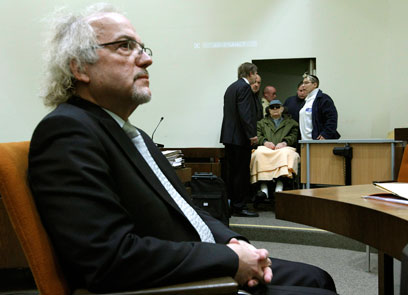

Investigator: Evidence shows Demjanjuk at Sobibor
Thomas Walther, who led investigation that prompted Germany to prosecute retired Ohio autoworker, shows Munich state court postwar paperwork in which Demjanjuk noted 'Sobibor, Poland', where he is accused of having been a guard at a Nazi death camp, as place of residence
Demjanjuk, 89, a retired Ohio autoworker, is accused of serving as a low-level guard at the camp and charged as an accessory to murder in 27,900 deaths. It is the first time a conviction has been sought against someone so low-ranking without proof of a specific offense.
Demjanjuk rejects the charges, saying he never served at the Sobibor camp or any other Nazi camp.
But Thomas Walther, who led the investigation that prompted Germany to prosecute Demjanjuk, showed the Munich state court postwar paperwork in which Demjanjuk noted "Sobibor, Poland" as a place of residence.
Other evidence links Demjanjuk to the camp, including an SS identity card with a photo that says he worked at Sobibor, Walther said. The defense has disputed the card's authenticity.

Investigator and defendant in court (Photo: AP)
In a 1948 application for assistance from a refugee organization, Demjanjuk said that from April 1937 to January 1943 he worked as a driver for a company in Sobibor.
A 1950 report from the US Commission for Displaced People also noted that Demjanjuk told them he was an "independent farmer" in Sobibor from 1936 to 1943.
Though no living witnesses can identify Demjanjuk as a Sobibor guard, Walther said he decided to go ahead with the new prosecution, reasoning that if he was a guard there he was involved in the machinery of death.
He testified there were only two groups of people at Sobibor: the Nazi guards and their Jewish victims.
"Every member of the first group, with very high probability, took part in the murder of the second group," he told the court.
Demjanjuk claims to be a victim of mistaken identity, saying he was a Red Army conscript from Ukraine who was captured in Crimea in 1942 and held prisoner until joining the Vlasov Army. That force of anti-communist Soviet POWs and others was formed to fight with the Germans against the Soviets in the final months of the war.
Serious doubts
According to Walther, Demjanjuk told investigators that he had used Sobibor on forms to try and obscure the fact he was Ukrainian. He wanted to avoid deportation to Ukraine, where he would have faced likely prosecution by the Soviets for serving in the Vlasov Army.
Walther said Demjanjuk first said he was given the name "Sobibor" by a consular official, then in another statement told investigators that he had picked it randomly from a map.
The investigator, who has now retired from the special German prosecutors' office responsible for investigating Nazi-era crimes, said the name Sobibor — a tiny town in eastern Poland — only shows up on the most detailed maps of the time. He said he had serious doubts that Demjanjuk picked it randomly.
He also cited a US appeals court ruling from 2006 when Demjanjuk lost a bid to stop his deportation. It found a previous court had made clear the evidence showed he was at Sobibor.
"The district court found the respondent served willingly as an armed guard at two Nazi camps in occupied Poland," the ruling said, naming "the Sobibor extermination center and the Majdanek concentration camp."
Demjanjuk, wearing sunglasses, lay in a bed during Tuesday's proceedings with a cap pulled down over his eyes.
Demjanjuk is being tried in Munich because he lived in the area briefly after the war. He emigrated to the US in 1952 and gained citizenship in 1958.
In the 1980s, Demjanjuk stood trial in Israel accused of being the notoriously brutal guard "Ivan the Terrible" at the Treblinka extermination camp. He was convicted, sentenced to death — then freed when an Israeli court found that he was a victim of mistaken identity.















